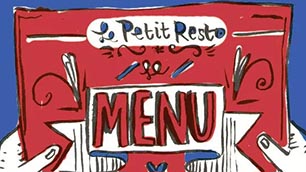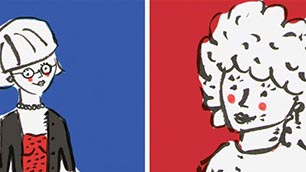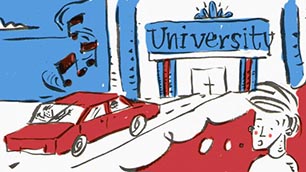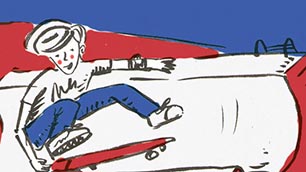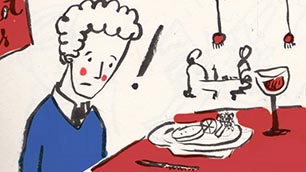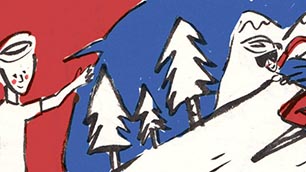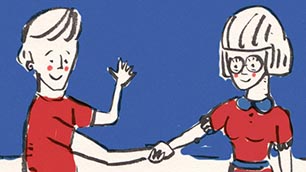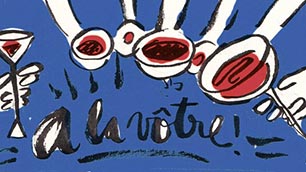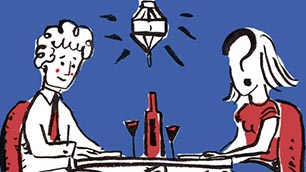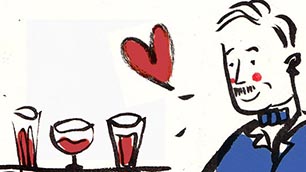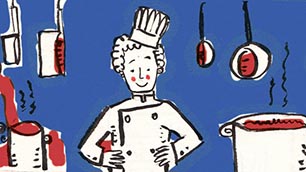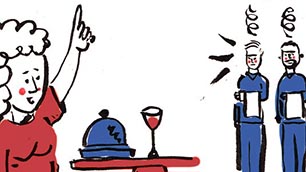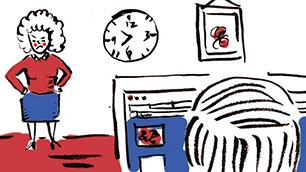| Valérie: | Now, let’s work on our new expression. Let’s see, how many have we learned so far, Michelle? |
| Michelle: | We’ve learned ah bon, il y a, voilà, voici. |
| Valérie: | That’s great! All are very useful and common in French. Il y a beaucoup de petites expressions en français Michelle. |
| Michelle: | Petites expressions... Small expressions? |
| Valérie: | Exactement. Voici une nouvelle expression, vous êtes prête ? |
| Michelle: | Oui, allez-y. |
| Valérie: | Aujourd’hui, l’expression est ça va. |
| Michelle: | Ça va. Aujourd’hui, l’expression est petite. |
| Valérie: | Oui. Those are two words that can say a lot. |
| Michelle: | J’aime les petites expressions. J'aime les petits cafés. J’aime everything that’s petite. Vous êtes petite Valérie. |
| Valérie: | Oui, je suis petite. En français, petit is masculine and petite is feminine. It means short in size when describing a person. |
| Michelle: | Oh pardon, that’s not what I meant at all. I meant you’re small. |
| Valérie: | Pas de problème Michelle, I am short. Je suis petite. |
| Michelle: | ... no, I meant you have a small build, and it’s cute... mignon. So sorry. |
| Valérie: | Ça va Michelle, ça va. You see how I just used ça va ? What does it mean in this context? |
| Michelle: | Oui, it means... "don't worry about it". J’ai raison ? |
| Valérie: | Oui, vous avez raison. You’ll hear ‘ça va’, mostly used to ask someone how he or she is doing. It’s the most common greeting. |
| Michelle: | Ah bon ? |
| Valérie: | Oui. Let’s remember that it is an informal expression, so you wouldn’t normally ask your boss: “ça va aujourd’hui ?” |
| Michelle: | It would be impolite? |
| Valérie: | Unless you are friends with him. So how would you greet him? |
| Michelle: | Bonjour, comment allez-vous aujourd’hui ? |
| Valérie: | Très bien. But you could use ça va with your colleagues and your peers. |
| Michelle: | D’accord. Can I ask you: ça va Valérie ? |
| Valérie: | Hmm, I guess you could. “Comment ça va” is slightly less informal than ça va so let’s use this one with each other. |
| Michelle: | Ok. But I still have to use ‘vous’ when I address you. |
| Valérie: | Oui, exactement. |
| Michelle: | So “comment allez-vous ?” et “comment ça va ?” are my options. |
| Valérie: | Oui Michelle. |
| Michelle: | How would I ask my husband this: “how are you, my darling?” |
| Valérie: | Euh, my darling... I would probably say “ça va mon chéri ?” |
| Michelle: | Mon chéri ? I love mon chéri. J’aime mon chéri... Mon chéri... hmmm. |
| Valérie: | Ça va Michelle ? |
| Michelle: | Oui, ça va. I’m just thinking of the chocolates Mon Chéri. I ate so many when I was in France. Hmm, a heart of cherry, floating in liqueur in a chocolate shell. |
| Valérie: | Vous aimez le chocolat ? |
| Michelle: | Oui, j’aime les Mon Chéri... Ils sont très delicious. And only 46 calories each. |
| Valérie: | Ah bon ? How do you know that? |
| Michelle: | I did my research. I wanted to know how many a day I could eat. 46 calories, ça va. |
| Valérie: | Oui, ça va. |
| Michelle: | Did you know that the Mon Chéri here are filled with hazelnuts instead of liqueur? |
| Valérie: | You mean, for the American market? |
| Michelle: | Oui. |
| Valérie: | You did do some research. |
| Michelle: | Ça ne va pas Valérie! |
| Valérie: | Pourquoi ça ne va pas ? |
| Michelle: | They are 65 calories each. 19 calories more! Non Valérie, ça ne va pas bien ! Another reason to live in France! Low-calorie chocolates! |
| Valérie: | Ok Michelle, ça va pour aujourd’hui. I’ll see you next week. |
| Michelle: | D’accord. Au revoir. |
| Valérie: | Au revoir ! And make sure you eat before next week’s lesson. |
| Michelle: | Oui, au revoir ! |




